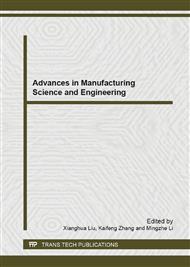p.2917
p.2925
p.2929
p.2936
p.2940
p.2944
p.2948
p.2952
p.2956
An Evolutionary Game Study on the Sustainable Product Development in Remanufacturing
Abstract:
The remanufacturability of product is mainly determined by product design and development strategy. But now most products are designed without considering the remanufacturing and recycling process. It is necessary to study manufacturers product design behavior to find measures to encourage environmentally favorable product design. Sustainable product development behavior of manufacturer population in remanufacturing was studied. An evolutionary game model with government subsidies was set up. And the evolutionary stable strategies were analyzed under different ranges of values of relative parameters. The results indicated that government subsidies were essential to make manufacturers develop sustainable product and large subsidies always worked well. Especially the results showed that small subsidies also worked under certain conditions, which including the initial state of manufacturer population and the relationship of government subsidies and manufacturers revenues under different product development strategies.
Info:
Periodical:
Pages:
2940-2943
Citation:
Online since:
June 2013
Authors:
Price:
Сopyright:
© 2013 Trans Tech Publications Ltd. All Rights Reserved
Share:
Citation:


